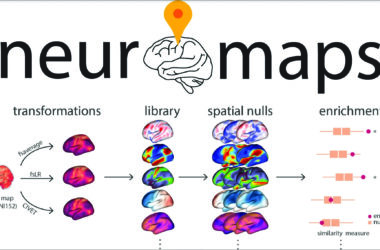Hemorrhages account for about two million potentially avoidable deaths around the world every year. With a 30 to 40 per cent rate of trauma mortality, the impact of hemorrhages worldwide cannot be understated. Yet, a group of researchers at McGill made a remarkable improvement in its treatment by developing bioadhesives[Read More…]
Research Briefs
Penguin feathers and the ice cube tray effect
One thing that is always on the mind during a Montreal winter is the cold and, more specifically, the ice. Living in Montreal makes slipping on ice inevitable. A painful landing on your behind, however, is not the only inconvenience associated with this crystalline structure. The buildup of ice on[Read More…]
Introducing neuromaps, a Python toolbox for neuroscience research
A team of McGill researchers published a paper in Nature Methods showcasing neuromaps, an open-source Python toolbox that allows neuroscientists to analyze brain imaging data using a consistent set of tools and compare it with a curated brain-map database. PhD candidate Justine Hansen, one of the paper’s first authors, spoke[Read More…]
Pneumococcal vaccination coverage concerningly low among at-risk adults
In the past few years, we have all become intimately familiar with upper respiratory infections. With the annual cold, flu, and respiratory syntactical virus all on the rise, and the ever-present threat of COVID-19 looming over every crowded room, there is a lot to worry about during the upcoming winter[Read More…]
What’s in your water? This revolutionary AI technology breaks it down
Across the planet, corporations and municipalities account for over 30 per cent of accessible and renewable freshwater usage. They generate colossal amounts of wastewater containing various concentrations of elements such as copper, zinc, titanium, and mercury, which unfortunately make their way into our drinking water. Now, instead of worrying about[Read More…]
Innovative algorithm develops theories on rules of human language
Over the last several years, artificial intelligence (AI) has made huge strides forward in the areas of language modelling and translation. Recent improvements are exemplified by the accuracy of machine translation services such as Google Translate, the ability of devices like Amazon’s Alexa to interpret and respond to instructions given[Read More…]
Expanding the surgeon’s toolkit: Machine learning in the operating room
Data science and machine learning, a branch of artificial intelligence (AI), may soon be making their way into operating rooms as integral parts of the surgical toolkit. The Feindel Brain and Mind Lecture Series tackled this cutting-edge development at its Nov. 2 event hosted at The Montreal Neurological Institute-Hospital. Pierre[Read More…]
Alert: Parasitic invasion in your intestines
If you have ever watched the television series Monsters Inside Me, you may be familiar with parasitic worms. Each episode features a dramatization of an infectious disease case, with an accompanying explanation of its cause. Cases dealing with parasitic worms range from a teenager infected with the parasitic worm, Trichinella[Read More…]
Modernizing investing: The rise of fintech in business lending
Suppose NeuroConnect, a fictitious company, requested a loan of $300,000 from October, a real financial technology (fintech) lending platform. The loan would be doled out over the course of 36 months to finance the acquisition of lab equipment like an electron microscope and an MRI scanner. October uses an automatic[Read More…]
Modelling sea level increases based on planetary warming scenarios
In the past few decades, human-driven global warming has left many questioning the future of the Earth’s oceanic dynamics and the implications of altering them. The Antarctic ice sheet (AIS), the largest body of ice on the planet, is retreating at an accelerated rate due to increased greenhouse gas emissions[Read More…]















